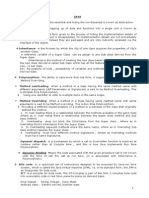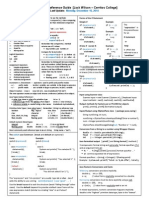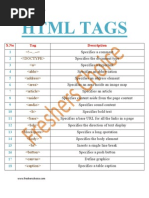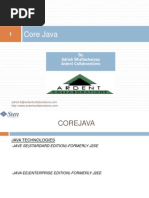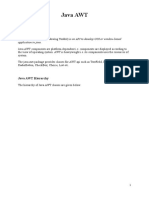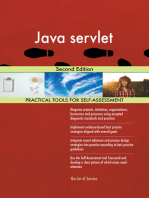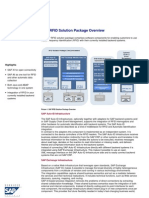Java Cheatsheet
Uploaded by
dinesh3434Java Cheatsheet
Uploaded by
dinesh3434Core Java Class Cheatsheet
Class can have only public and default access. Public class needs to be in same name java file. Single java file can contain more then one non public class but can have only one public class. A public class can be seen by all classes from all package A class with default access can be seen only by classes within the same package. Java file with no public class have no naming restriction. Class can also have final and abstract & strictfp non access modifiers. An abstract class can not be inistiated. A final class can not be subclassed. A class can not be both final and abstract. Class visibility can be seen in 3 parameter If a class can extend another class? If a class can create instance of another class? If a class can access methods and variable of another class?
Constructor Cheatsheet
Constructor is invoked when a new object is created. Constructors can also be overloaded but it can not be overridden. Every class has at least one constructor. If user doesnt provide any JVM will provide a default no arg constructor. Abstract class also has constructor. Constructor must have the same name as class. Constructor cant have a return type. If a method with the same name as class has return type will be treated as normal member method and not constructor. Constructor can have any access modifier(All). Default constructor is a no arg constructor which calls the no arg constructor of super class. In case super class doesnt have any no arg constructor then it will throw a run time exception. In case where a class has default constructor, its super class needs to have a no arg constructor. First statement of a constructor can be either this or super but can not be both at the same time. If coder doesnt write any this or super call then compiler will add a call to super. Instance member can be accessible only after the super constructor runs. Interfaces do not have constructors. Constructor are not inherited. Hence can not be overridden. Constructor can not be directly invoked. It will be invoked(Implicitly) when a new object is created or a call by other constructor.
Inner Class Cheatsheet
Inner class is member of enclosing class. Outer class reference is required to initiate inner class. Inner class are of 4 type.
Inner classes defined within method are method local inner class. Method local inner class can not access method local variable. Final & Abstract are the only modifiers available to method local inner class. Ananymous inner class dont have any name. Inner classes having Static modifier are known as Static inner class. Static nested class can not access non static member of outer class.
Access Modifier Cheatsheet
Public, Private, Protected are 3 access modifier There are 4 access levels in Java. Public, Private, Protected & Default. A class can have only public and default access level. Methods and Instance variable (non local) can use all 4 access levels. If a class is not visible to other class there is no question of accessing member of that class, even when access level of that member is public(Important). Class visibility should be checked before member visibility. If a super class has public member then it will be inherited by subclasses even if it is in other package. this always refers to the current executing object. A public member can be accessed by all other class even from other package. Private members can be accessed only by the code in the same class. Default members are not visible to subclasses outside package while protected members are visible to subclassed even when they are in different package. Different between protected and default comes into picture only in the case of subclass outside package. Local variables can not have access modifiers. Local variables can have only final non access modifiers that can be applied.
Non Access Modifier Cheatsheet
Non Access Modifiers available in Java are Static, final, abstract, synchronized & Volatile Static keyword can be applied to Variables & Methods. Static Variable are those variables which are not associated to any instance but it is associated to class means all instances will access the same single copy of variable. Local variables can not be declared as Static. Static keyword can also be applied to Methods. They will work for all the instances and they will not be dependent on instances created. Final modifier can be applied to method and variables. Final is the only modifier which will be available to local variable. Once declared as final value of the variable can not be changed. Final variable dont get default value opposed to instance variable coz value cant be changed once assigned. Final method can not be overriden.
String Cheatsheet
String Object is used for holding String of text. Part of java.util package. Strings can be added by using concatenation Operator(+). Characters use single quotes( ) as delimiter while Strings use double quotes( ) as delimiters.
String objects are immutable. Value of the string object can not be changed once assigned. String class is final means method of the String class can not be overriden. All String literals are added to String pool by JVM. String have method length() while Array have a property length to check the length. To overcome the immutable property of String StringBuffer and StringBuilder comes into picture.
Thread Cheatsheet
Thread can be created by extending Thread Class and overriding the run() method. Thread can also be created by Implementing Runnable interface and then calling Thread constructor that takes Runnnable argument. start() method can be called on Thread Object only once. Once start() method is called on Thread Object it becomes thread of execution. Before start() method called it is said to be in new state and is not considered alive. There is no guarantee of order in which Thread will get executed after getting started. We can influence the order in which Thread get executed by setting its(Thread) priority(1-10). A running thread may enter blocked/waiting state by wait(), sleep or join() call. A runnning thread may enter blocked/waiting state because it cant acquire the lock of a synchronized block of code. A dead thread can not be started again.
Static Keyword Cheatsheet
Static is a Non Access Modifier. Static modifier can be applied to Variable / Method / Block / Inner Class. Static members belong to class only not any instance. Static method can not access instance variable. Static methods can not be overriden. As they are class specific and doesnt belong to any Instance. Static methods can be redefined. Static variable can not be directly accessed by Non Static Methods. If a class contain any static block then that block will get executed only when class get loaded in JVM. Creating multiple instances doesnt mean that Static block will get executed multiple time. Only Constructor will get executed multiple time. If Class.forName(class_name) is called then static block of the class will get executed.
Interface Cheatsheet
Interface are 100% abstract class(Implicitly). Interfaces can be implemented by any class from any inheritance tree. All methods in Interfaces are abstract. Interface can have constants, these constants are public, static and final(Implicitly). Interface methods are implicitly public & abstract. Class implementing an interface can also be an abstract class. An abstract class which is implementing an interface need not implement all abstract method. A class can extend more then one Interface. Interfaces can not extend a class or implement an Interface.
Interface can extend another Interface. A non abstract class which is implementing an Interface needs to follow some rules . This class needs to provide concrete implementation of all abstract method. All rules of Overriding needs to be followed. It must maintain the exact signature of method.
String Builder Cheatsheet
Difference between StringBuilder and String Buffer is that StringBuilders method are not synchronized. String Builder is mutable which is opposite to String which is Immutable. StringBuilders equals method is not overriden, Hence it doesnt compare the value of StringBuilder. As it does in case of String.
Serialization Cheatsheet
Serialization interface needs to be implemented in order to make object serialized. Transient instance variable doesnt serialized with Object state. If Super class implements Serializable then sub class are also Serializable automatically. If Super class is not serializable then when sub class is de serialized then super class constructor will be invoked.
Overloading Cheatsheet
Using the same method name but with different argument is called overloading. Constructors can also be overloaded Overloaded methods must have different argument set. Overloaded methods may have different return type. Overloaded methods may have different access modifier. Overloaded methods may throw different exception broader or narrow no restriction Methods from super class can also be overloaded in subclass. Polymorphism applies to overriding not Overloading Which overloaded method will be invoked is decided on compile time on the basis of reference type.
Overriding Cheatsheet
Constructor can not be overriden. Overriding methods must have the same argument set. Overriden methods must have same return type. These return type can also be the subclass(covariant return). Overriden method can not have more restrictive access modifier. Overriden method can not throw new or broader exception(Checked).
Overriden method can throw any unchecked exception. Final methods can not be overriden. Private methods are not inherited to subclass hence it can not be overriden in subclass. Polymorphism applies to overriding. Object type determines which overridden method will be invoked and that will be decided at theruntime.
Exception Cheatsheet
Checked & unchecked exception are two type of Exception. Checked exception are those exception which are subtype of Exception class but excluding classes which extends Runtime exception. Subtype of Error and Runtime Exceptions comes under unchecked Exception. Finally block will always be invoked in all condition. System.exit() is the only way when finally block will not get executed coz in that case JVM will shut down. Custom Exception can also be created by extending Exception class. Catch block should be order in the form of most specific to most general. Otherwise compiler will complain for unreachable code.
Java Collection Framework Cheatsheet
1. 2. 3. 4. 5. 6. 7. 8. 9. 10. 11. 12. 13. Collection is a data structure in which Objects are stored. Objects can be Added, Deleted and can traversed in Collection. There are 4 type of basic Collection List : Ordered, Duplicates are allowed, Indexed Sets : May or may not Ordered. Duplicates are not allowed. Maps : Duplicate keys are not allowed. Queue : Ordered by FIFO or priority. ArrayList : Fast Iteration & Fast Random Access. Vector: Synchronized Method. LinkedList : Good for implementing Stack and Queue. HashSet : Fast Access, No Duplicates, No Ordering. LinkedHashSet : No Duplicates, Iterates by insertion order. TreeSet : No Duplicates, Iterates in sorted order.
Local Variable Cheatsheet
Can not use any of the access level as it has the life inside method only. Only non access modifier that can be applied to Local Variable is Final.
Local Variables dont get default value, hence local variable need to be initiaited before it can be used.
Instance Variable Cheatsheet
Public, Private, Protected all 3 access modifiers can be applied to Instance Variable( Default also). Instance variable will get default value means instance variable can be used without initializing it. Same is not true for Local Variable. Instance Variable can be marked final. Instance Variable can be marked transient. Instance Variable can not be abstract. Instance Variable can not have synchroonized modifier. Instance Variable can not have strictfp modifier. Instance Variable can not have native modifier. Instance Variable can not have Static modifier as it will becomes Class level variable.
Instance Variable Type Default Value boolean false byte (byte)0 short (short) 0 int 0 long 0L char u0000 float 0.0f double 0.0d Object null
Tags: instance variable, instance variable default value, java instance variable
Java Inheritance Cheatsheet
All public variables of Super class will be inherited by subclass. All default variables will be inherited by all subclass in the same package only. Subclass outside the package will not inherit any default memeber. Private member can not be inherited by subclass because it will not be visible to subclass and hence subclass can create the method or property with the same name without any problem. Protected variable will be inherited by all subclass in the same package or outside package(Different from default). Methods which are not inherited can not be overriden. And hence overriden rules can not be applied to those Methods. But Methods can still be defined in subclass but those methods will not be overriden method but a new method. Static methods /variables do not take part in inheritance. Even static methods / variables do not take part in inheritance hence they can not be overriden but they can be redefined in subclass. Redefinition is not called overriden but hidden.
Primitives Cheatsheet
TO DO
You might also like
- Java 17 Backend Development: Design backend systems using Spring Boot, Docker, Kafka, Eureka, Redis, and TomcatFrom EverandJava 17 Backend Development: Design backend systems using Spring Boot, Docker, Kafka, Eureka, Redis, and TomcatNo ratings yet
- Yet Another Insignificant Programming Notes60% (5)Yet Another Insignificant Programming Notes5 pages
- Programming in Java: UNIT-3 (GUI Designing and Event Handling)No ratings yetProgramming in Java: UNIT-3 (GUI Designing and Event Handling)76 pages
- TCP2201 Object-Oriented Analysis and DesignNo ratings yetTCP2201 Object-Oriented Analysis and Design69 pages
- Notes On JAVA 10.2005.3: Syntax of CommandsNo ratings yetNotes On JAVA 10.2005.3: Syntax of Commands3 pages
- Java Exception Handling For Certification InterviewsNo ratings yetJava Exception Handling For Certification Interviews42 pages
- Serene and Clear: An Introduction To Buddhist Meditation: Week Two: Contemplating MovementNo ratings yetSerene and Clear: An Introduction To Buddhist Meditation: Week Two: Contemplating Movement6 pages
- Dell EMC Avamar Virtual Edition For Azure Installation and Upgrade Guide 7.5No ratings yetDell EMC Avamar Virtual Edition For Azure Installation and Upgrade Guide 7.540 pages
- Telit GE865-QUAD Hardware User Guide r15No ratings yetTelit GE865-QUAD Hardware User Guide r1577 pages
- (Ebook) CCTV, Second Edition: Networking and Digital Technology by Vlado Damjanovski ISBN 9780080472195, 9780750678001, 0080472192, 0750678003download100% (5)(Ebook) CCTV, Second Edition: Networking and Digital Technology by Vlado Damjanovski ISBN 9780080472195, 9780750678001, 0080472192, 0750678003download49 pages
- Pre-Installation Checklist Vanquish V1-2a PDFNo ratings yetPre-Installation Checklist Vanquish V1-2a PDF5 pages
- Y.Ramesh Kumar: Tata Consultancy ServicesNo ratings yetY.Ramesh Kumar: Tata Consultancy Services4 pages
- KCCTech - Business Portfolio and Solutions 2023R3No ratings yetKCCTech - Business Portfolio and Solutions 2023R346 pages
- Bizzmantra Profile For Tracking SolutionNo ratings yetBizzmantra Profile For Tracking Solution22 pages






